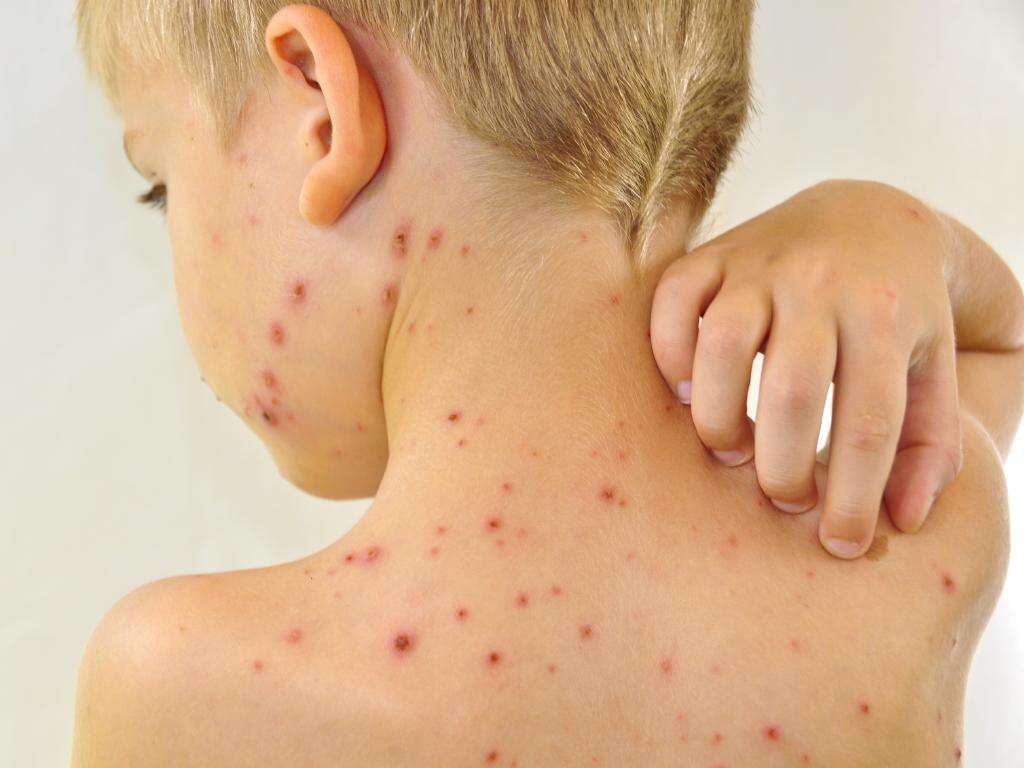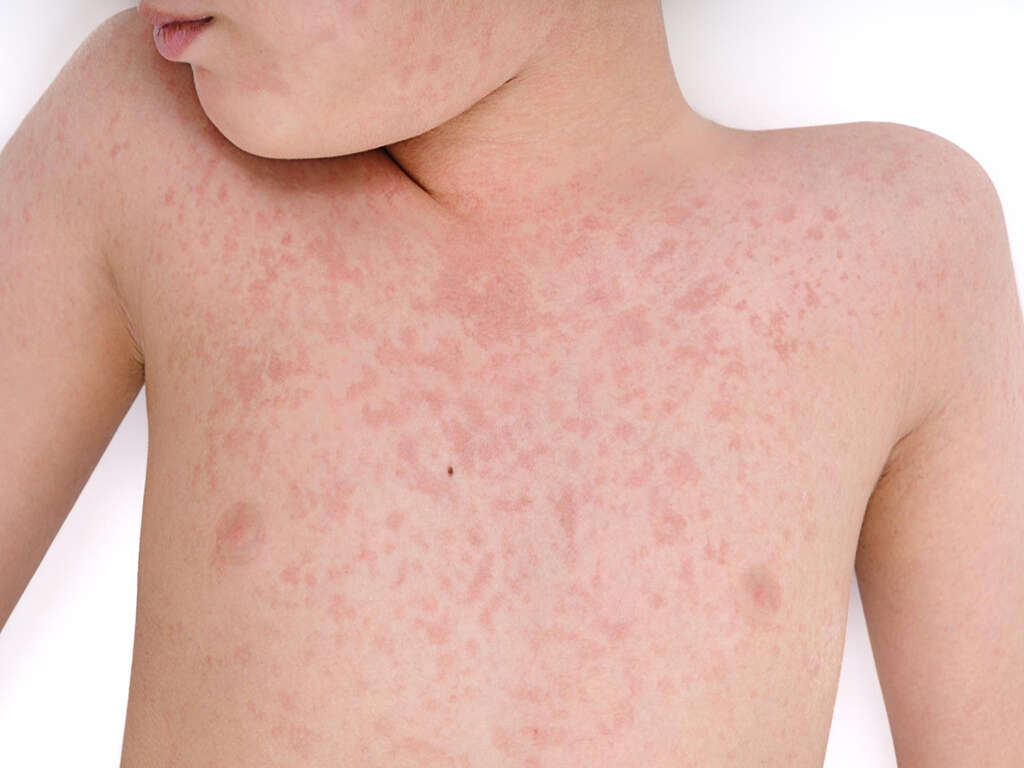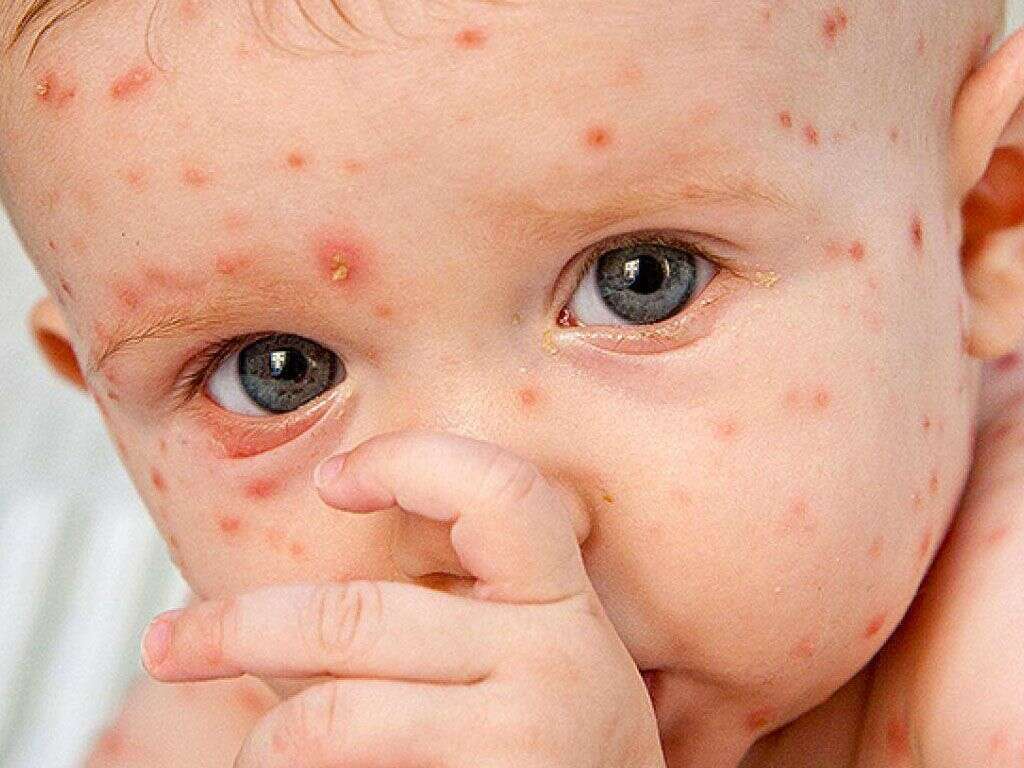German Measles Symptoms, Treatments and More
 Article Sources
Article Sources
- 1. 'Rubella.' Mayo Clinic, Mayo Foundation for Medical Education and Research, 31 Mar. 2020, www.mayoclinic.org/diseases-conditions/rubella/symptoms-causes/syc-20377310.
- 2. 'Rubella' (German Measles). National Foundation for Infectious Diseases, 13 July 2020, www.nfid.org/infectious-diseases/rubella/.
- 3. 'Rubella.' Encyclopædia Britannica, Encyclopædia Britannica, Inc., 18 Mar. 2021, www.britannica.com/science/rubella.
- 4. 'Rubella (German Measles).' Rubella (German Measles) | Michigan Medicine, www.uofmhealth.org/health-library/hw181833.
German measles, also known as rubella, is a virus that causes a distinctive red rash. It has the appearance of measles, but rubella is a different viral infection. Although it's less severe than the measles virus, it can cause serious complications for unborn babies.
Rubella isn't common in many nations because of the measles-mumps-rubella vaccine. However, unvaccinated individuals can still get and spread the virus. German measles isn't as infectious as measles, but anyone with the virus should take preventive measures to reduce the spread and protect unborn babies and newborns.1‘Rubella.’ Mayo Clinic, Mayo Foundation for Medical Education and Research, 31 Mar. 2020, www.mayoclinic.org/diseases-conditions/rubella/symptoms-causes/syc-20377310.
1. What is German Measles?
Rubella is a contagious viral infection that was eradicated from the U.S. in 2004 with the measles-mumps-rubella vaccine. It speeds through tiny droplets in the breath of infected individuals when they talk, sneeze, cough or share foods and drinks. German measles has mild symptoms, but it can cause birth injuries if transferred through the womb from mother to child.
The last outbreak of rubella occurred from 1964 to 1965. During the epidemic, 12.5 million Americans contracted it, 11,000 pregnant women lost their babies, 2,100 newborns died and 20,000 infants were born with congenital rubella syndrome.2‘Rubella’ (German Measles). National Foundation for Infectious Diseases, 13 July 2020, www.nfid.org/infectious-diseases/rubella/.
2. German Measles Symptoms
Rubella has mild symptoms compared to measles, but they're not pleasant. The signs of German measles show about two to three weeks after exposure. The rash associated with rubella has unique characteristics. It begins on the face, quickly spreads to the body then arms and legs then disappears in the same sequence.
Other symptoms include low-grade fever, headache, swollen lymph nodes, a slight cough, mild fever and a stuffy or runny nose. Young women with the virus might also experience aching joints.

3. What Causes German Measles?
The rubella virus causes German measles, which is sometimes referred to as the three-day measles because of its milder symptoms and shortened duration. Although it has measles in its name, it's not caused by the same viral infection.
The word German refers to the country where the virus was first identified, and rubella is a Latin term for little red. The infection can spread to infants, adults and pregnant women.3‘Rubella.’ Encyclopædia Britannica, Encyclopædia Britannica, Inc., 18 Mar. 2021, www.britannica.com/science/rubella.
4. When to Call a Doctor
Contact the doctor as soon as a suspected case or exposure to German measles is known. While rubella only causes mild symptoms, patients who aren't vaccinated are at risk of contracting the virus. People with compromised immune systems, pregnant women and those trying to conceive can develop serious complications.
There's no need to wait for symptoms, which can take two to three weeks to start. A simple blood test can detect German measles.

5. Treatment for German Measles
Unfortunately, there are no specific treatments for rubella, but some over-the-counter products can help reduce symptoms. Most adverse reactions to the viral infection are treatable through bed rest, non-steroid anti-inflammatory drugs (NSAIDs) to reduce the fever and plenty of fluids.
Patients can also take over-the-counter decongestants for any cold-like symptoms. For any itching associated with the rash, consider applying a topical application to soothe the skin. Give children acetaminophen, rather than aspirin.4‘Rubella (German Measles).’ Rubella (German Measles) | Michigan Medicine, www.uofmhealth.org/health-library/hw181833.
6. How Long Does Recovery Take?
The good news about the rubella virus is the duration. It's milder than measles and the symptoms don't last as long. About 25-50 percent of adults who get the infection don't experience any symptoms.
Younger children see relief in two to three days. Older kids may get a full upper respiratory infection, which can increase the duration of symptoms. Any lingering issues might be another illness, and a doctor should be consulted.

7. German Measles Complications
Complications are a concern for pregnant women who contract rubella. The virus can cause a miscarriage or severe birth injuries. Congenital rubella syndrome is a serious condition that can be fatal, and couples planning a family should make sure they're vaccinated prior to conception.
The vaccine isn't administered to pregnant women, and patients must wait four weeks after vaccination before conception to avoid complications. Brain infection and bleeding problems for both men and women are rare complications.
8. What is Congenital Rubella Syndrome?
Congenital rubella syndrome (CRS) is a severe complication that can develop when mothers are infected with German measles. Over 75% of women who contract rubella in the first 12 weeks of pregnancy gave birth to CRS babies.
Congenital rubella syndrome symptoms can include deafness, organ defects, intellectual disabilities, cataracts and growth delays. Infants might also be born with congenital heart defects. Although the greatest danger is in the first trimester, CRS can develop throughout the pregnancy.

9. Can People get German Measles Twice?
Most people build a long-term, perhaps lifelong immunity after contracting the viral infection. Vaccination also offers long-term protection against rubella. The risk of getting German measles twice is extremely low.
Less than 10 people contract rubella in the U.S. each year. Although newborns are still susceptible to the virus before vaccination, if their mother was immune, she passes those protections to the infant through antibodies. These antibodies provide about six months of security for newborns.
10. Preventing German Measles
The MMR vaccine helps prevent German measles, measles and mumps. Children receive the MMR vaccine between 12-15 months of age, and then again before entering school. Rubella spreads through droplets of saliva, therefore it's always a good idea to cover your coughs and sneezes.
Most people in the U.S. and other developed nations have received the measles-mumps-rubella vaccine. Pregnant women may want to put off foreign travel to avoid exposure to the disease.










